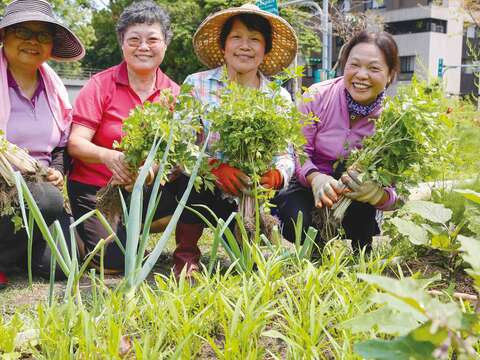Post date:2016-07-11
Updates:2016-08-23
1585
Article _ Chung Wen-Ping
Photos _ Jilian Yang, Public Works Department Parks and Street Lights Office, and Taipei City Yangming Home for the Disabled, Taipei City Government
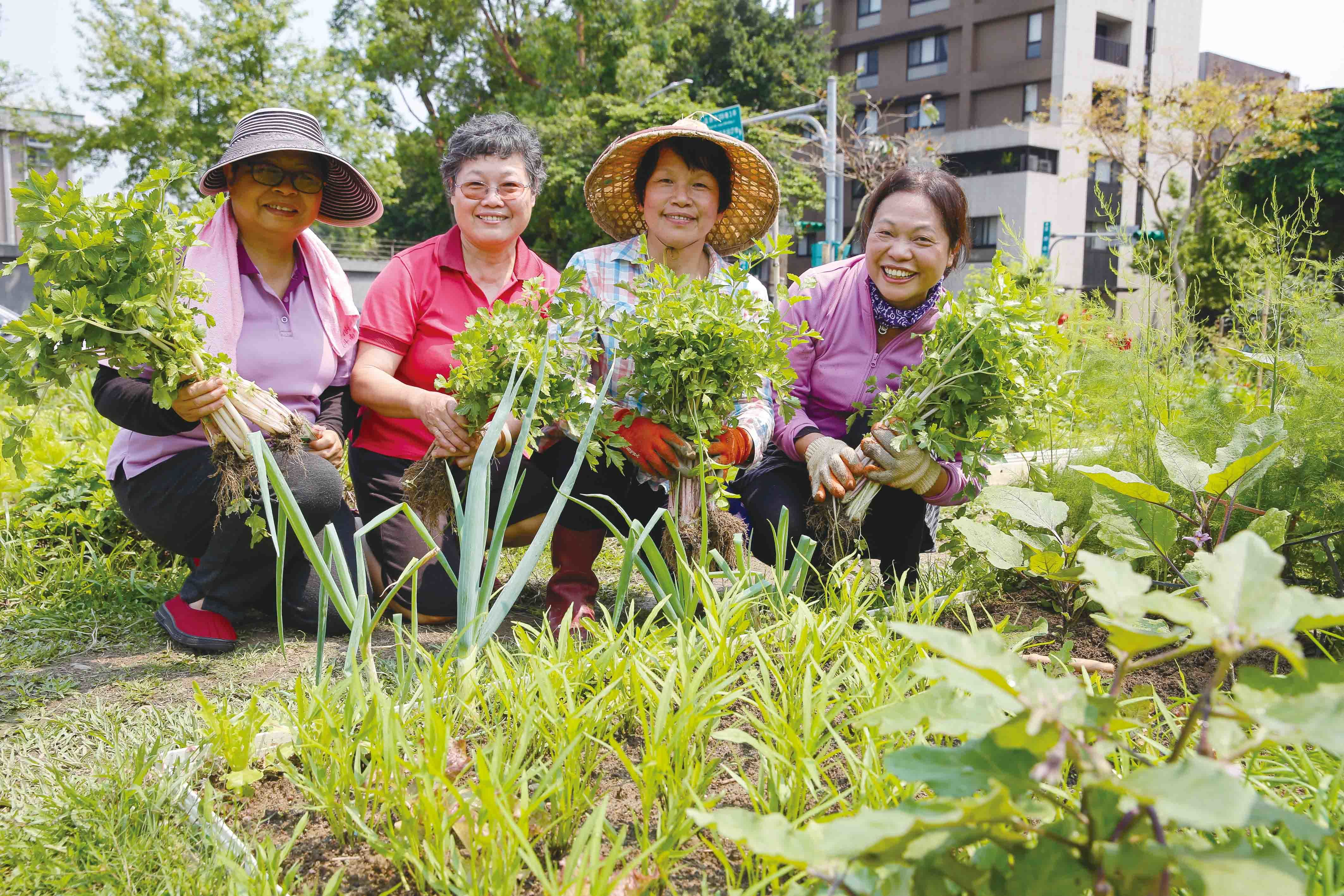
1. Many people in Taipei are planting vegetables in once-unused community spaces, achieving physical and emotional wellbeing. (Photo: Jilin Yang)
How popular is “being a farmer” nowadays? International futures expert Jim Rogers once said that if you want to become rich, you should become a farmer. However, in cities where space is at a premium, becoming rich by farming is easier said than done. Many people are nevertheless making use of rooftops, balconies, and other empty spaces in their communities to grow fruits and vegetables. These people are not pursuing material wealth, but rather physical and emotional well-being, as well as the green beautification of their communities and even their entire cities.
A Community That Farms Together and Cooks Together
In April of this year, Happy Farm in the Pengcheng Borough (鵬程里) of Songshan District was harvested. A special event was held to celebrate the achievement and share the fresh food. The residents of this borough were invited to participate, and the harvested fruits and vegetables were used to create a variety of vegetarian dishes, enabling everyone to experience the fun of field and garden cultivation and harvesting. This was one of the sweet fruits of the Taipei City Government’s efforts to promote its Garden City Project. Farming has already become an indispensable part of life for this group of city residents.
Li-Yuan Huang (黃立遠), director of the Parks and Street Lights Office, Public Works Department, Taipei City Government (台北市政府工務局公園路燈工程管理處), notes that the promotion of Taipei as a garden city is mainly focused on urban unused spaces and the rooftops of public buildings. _ese include 12 public-building rooftop farms established with the assistance of the city’s Department of Economic Development, 239 micro-farm projects under the Department of Education (教育局), six farm-demonstration plots under the Parks and Street Lights Office, and 14 plots for a green community project under the jurisdiction of the
Department of Civil Affairs (民政局), as well as five public-rooftop farms under the Department of Social Welfare (社會局) and five farmland plots under Taipei City Hospital (台
北市立聯合醫院). Already, an accumulated 77,846 square meters of land have been put to use. The total number of people participating in farming activities has reached 22,590. This project has already been implemented by government agencies from top to bottom, and has gradually progressed to public proposals from bottom to top. One and all have the opportunity to develop a family, company, or community farm.
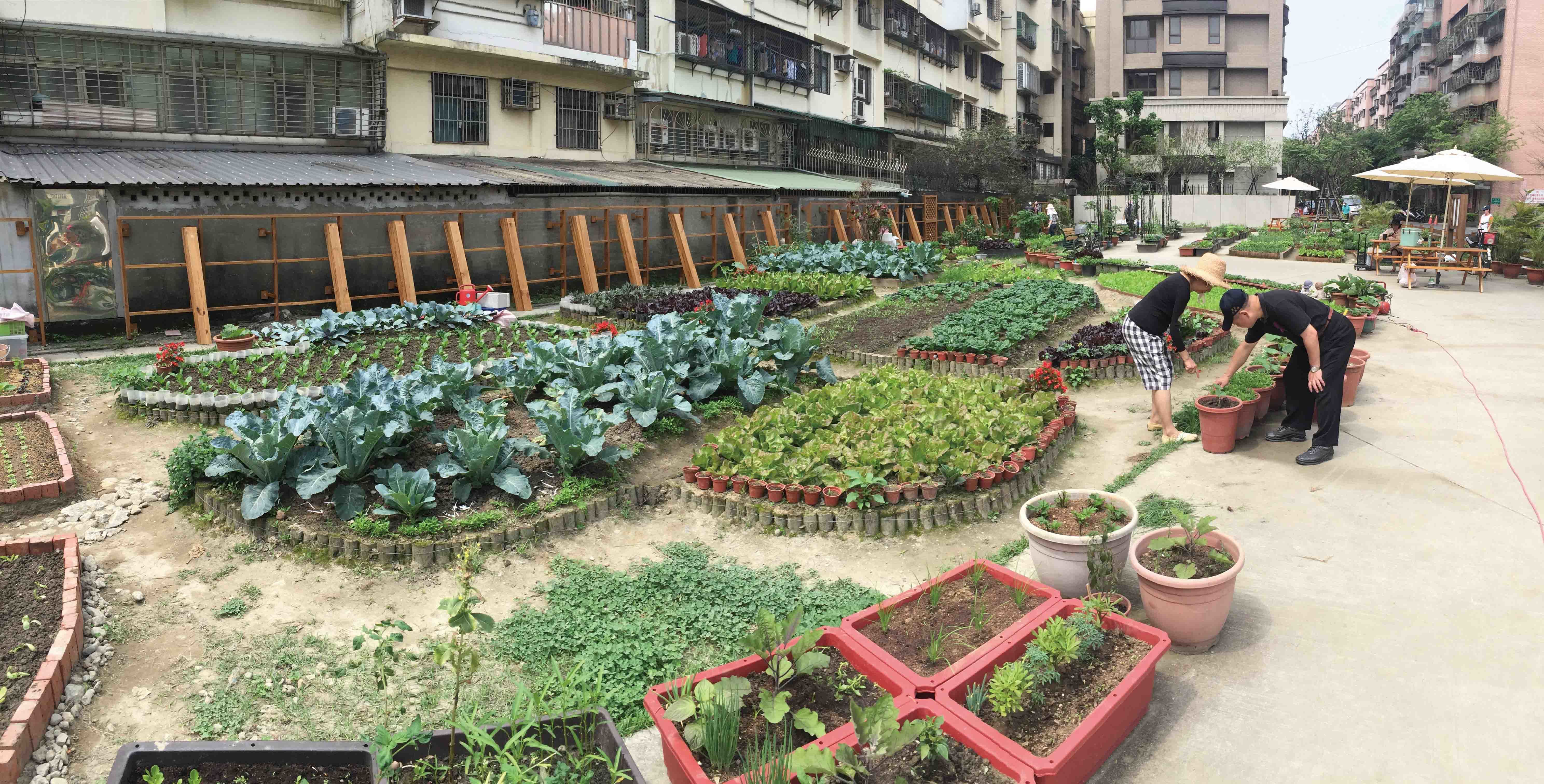
2. Pengcheng Borough’s Happy Farm is the first farm open to public participation in the Songshan District. (Photo: Parks and Street Lights Office, Public Works Department, Taipei City Government)
For example, the land for Pengcheng Borough’s Happy Farm was originally slated to be a parking lot. Last year, in July, to complement Taipei’s garden city policy, the residents of this borough were invited to a meeting to participate in the planning and design of this plot, the goal to create an ideal vegetable garden. Xu Yanjian (許顏建), the Pengcheng Borough chief, says that,“One small farm has brought about incredibly positive influence on the lives of our residents.”
The residents have been very keen to participate. Children learn about the growth process of plants as they farm, and the community has gained additional recreational space. Organic cultivation methods are advocated, and volunteers provide guidance to children in planting, composting, and removing insects without the use of pesticides. The plot-adoption method has helped residents understand the importance of maintaining a sustainable environment. By way of example, although butter_ies can be seen swi_ly flying about, there are no traces of destructive pests.
Xu explains that, “This is the achievement brought about by the careful attention paid to the care of this farm by all of the participating residents. At night they no longer watch TV. Instead, they make a special trip to the farm carrying flashlights to catch insects. This has become very common.” Happy Farm is the first farm open to public participation in the Songshan District. Xu notes the deep pride that all borough residents have taken in this initiative.
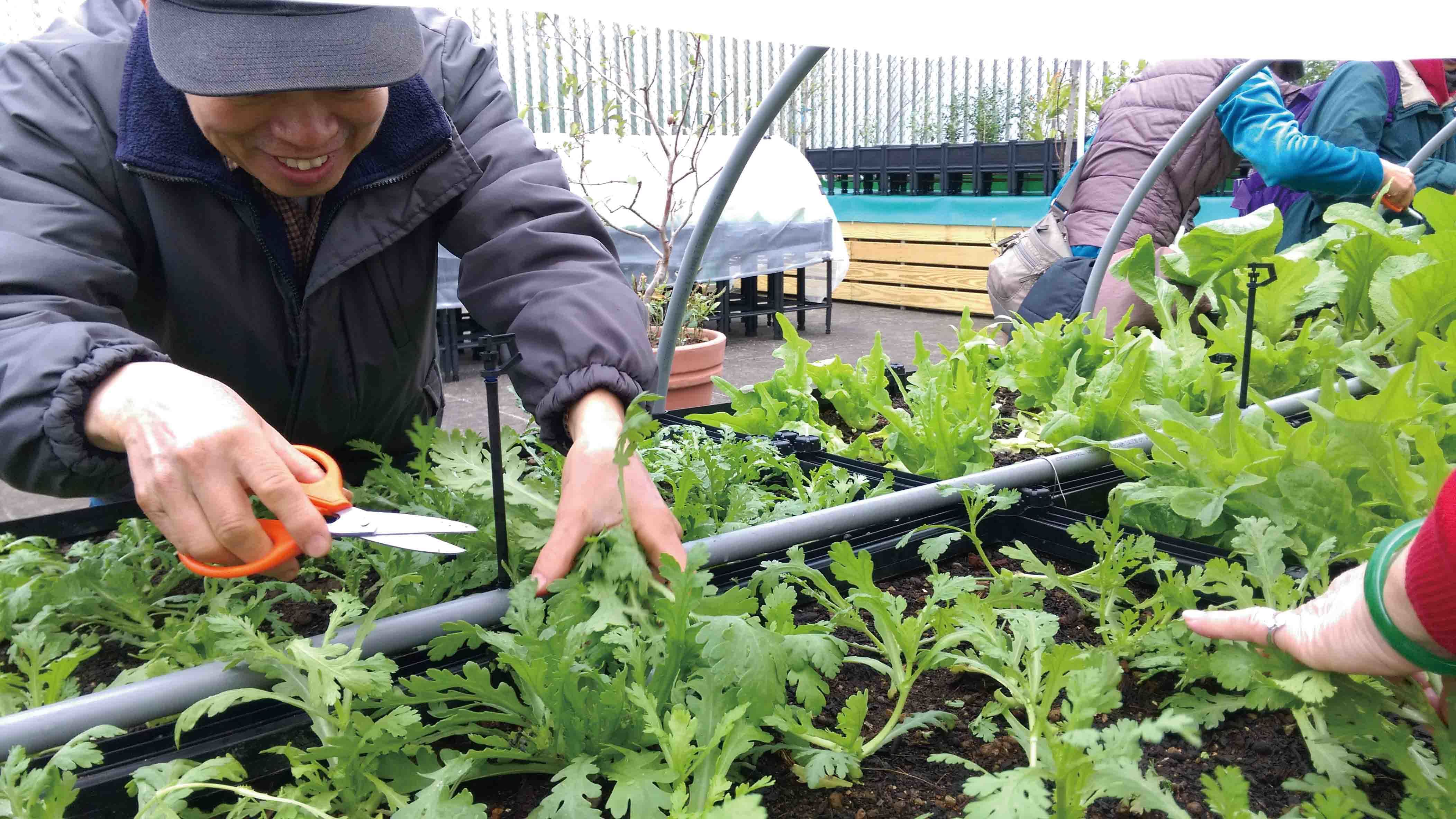
3. The residents of the Taipei City Yangming Home for the Disabled have shown a high level of interest in gardening work. (Photo: Taipei City Yangming Home for the Disabled)
Therapeutic Rooftop Garden for the Mentally and Physically Impaired
Across the city on Yangmingshan (陽明山), the Yongfu Branch of the Taipei City Yangming Home for the Disabled (陽明教養院永福院區) maintains an inspiring rooftop farm. The Yangming Home for the Disabled is the only public- welfare institution for the mentally and physically impaired in Taipei City. As the Yongfu Branch is on a narrow plot of land, most of its daily-living activities are limited to within the building, and there is a lack of green space, notably for outdoor activities. Administrators therefore referred to the emerging model of social care – the Green Care model – used in European countries for the promotion of
healthcare and the integration of farming and animal husbandry. In addition, they worked with a professional therapist to organize horticulture-therapy sessions. The home’s sixth floor rooftop has been used to create a rooftop farm, with detailed planning carried out to develop leafy vegetable, herb, and fruit-tree growing areas, creating a place where the 150 residents of this home can relax and admire the plant ecology.
As the majority of the home’s residents are wheelchair-bound, the passageway to the rooftop had to be made barrier-free. In addition, the height of the potted plants had to be suitable for those in wheelchairs, and a space had to be created for wheelchairs to be turned around. As the residents are unable to carry out complicated or overly exertive farming tasks, an automated watering system was installed. From irrigation to the addition of compost, everything features smart design, so that the residents are not required to carry out strenuous physical activities in order to get close to greenery.
This rooftop farm has been operating for nearly half a year. According to the observations of social worker Zheng Xinyi (鄭心怡), some residents may be resistant to exercise, but they express a high level of interest in gardening work. Although some residents are not able to personally engage in care for the rooftop farm, they can still find an escape from their pressures in this lush green environment.
Zheng says that this rooftop garden has allowed the residents to transform their role from “dependent on others” to “producers.”This has brought great benefit in terms of increasing sensory experiences, elevating confidence, and improving agility. These are positive outcomes that the social workers, volunteers, and family members are happy to see. The harvest from the rooftop farm is the source of the most welcome, healthy, and non-toxic ingredients in the home’s kitchen. Zheng smiles as she says that this rooftop farm has been an unexpected “windfall” for all involved: “We eat vegetables that we have planted ourselves. We plant what we want to eat. There is no better way to get closer to nature, and to benefit physical and mental health!”
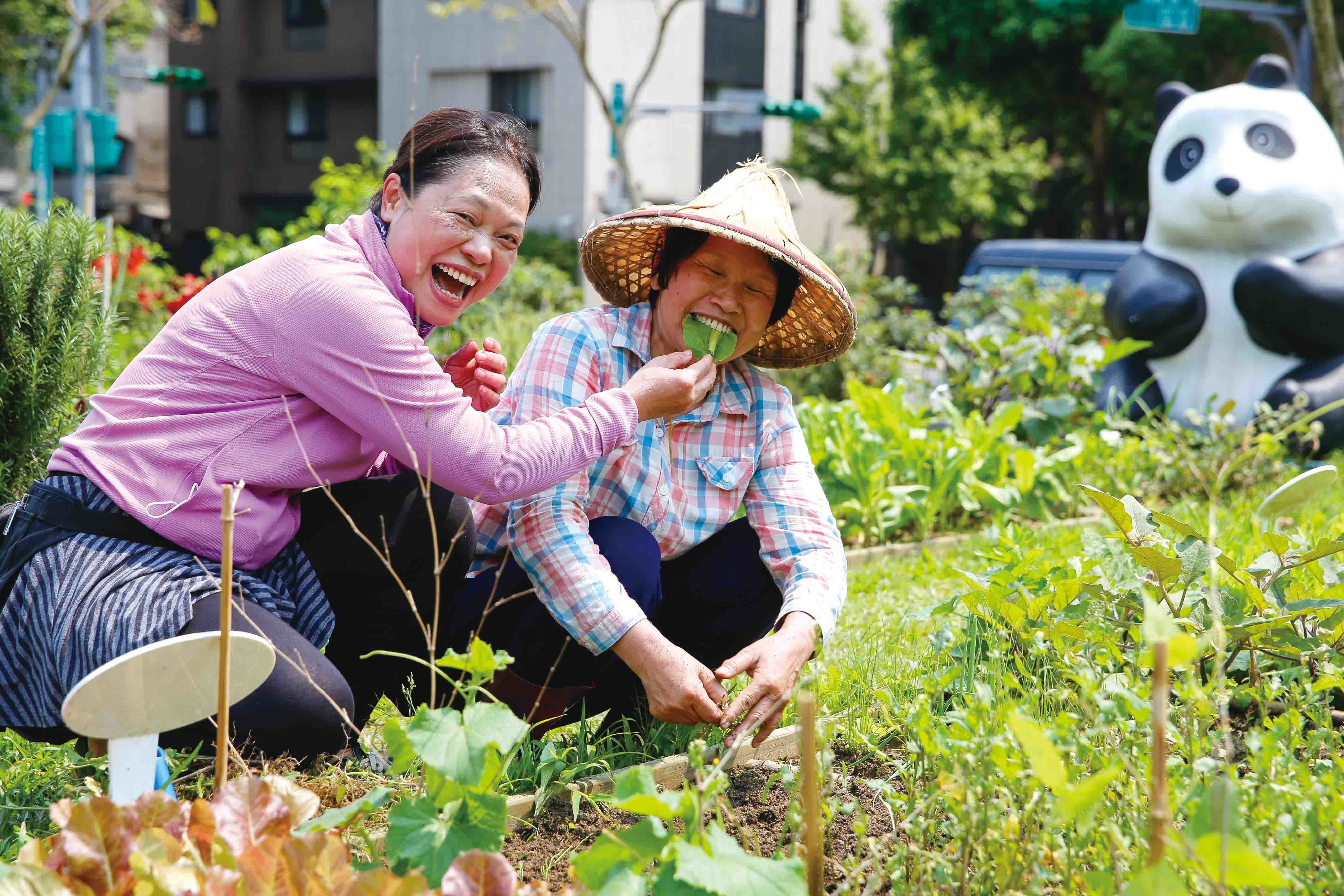
4. The Taipei City Government, in promoting the Garden City Project, has broken through the cold and detached relationships among city residents to reestablish interactions. (Photo: Jilin Yang)
Fresh Green Pearls Along Streets and Lanes
Along busy Section 4 of Zhongxiao East Road (忠孝東路), residents have spontaneously opened a farmers’ market in a small lane. _ere are only 10 or 20 stalls, all manned by farmers who refuse to use chemical pesticides or fertilizers, selling non-toxic agricultural products. The farmers who come here are looking for a market for their selfgrown-crops, and to share their beliefs regarding living in a friendly, natural environment with Taipei residents.
This small market reduces the distance between production areas and dining tables. It is like a small green “seed of desire” for a garden city among Taipei residents that has burst open in the middle of the cement jungle.
The Taipei City Government is systematically promoting the Garden City Project. In recent years, farms and gardens have been popping up all over in communities and neighborhoods. Along Guangfu South Road (光復南路) in Fujian Borough (復建里) is Bliss Farm. Along Fujin Street (富錦街) in Minsheng Community’s (民生社區) Dongrong Borough (東榮里) is Happy Farm. Both are community farms voluntarily set up by neighborhood residents. Each year, neighborhood residents can register to grow vegetables free of charge, and supply has not been able to keep up with demand.
Between lanes 32 and 46 along Guangfu South Road is a plot of land that sat idle for many years after a military dependents’community was demolished. In the past, many local residents made a deliberate effort to avoid this area of blight. Lin Jihong (林際泓), who was serving as chief of Songshan District’s Fujian Borough, persuaded the military to offer up the land for farming. He first portioned out a grid of 48 micro-farm plots, then leased them to residents free of charge. He states that, “In the beginning, I thought that with everyone being so busy, no one would want to plant vegetables. I never would have expected that in a few days all of the plots would be taken.” The current borough chief, Lin Kunxin (林坤信), has expanded the number to 168 plots. Each hundreds of households scramble to lease a plot.
Dongrong Borough’s Happy Farm covers an even larger area, more than 800 square meters. Originally, this was a lot left empty after an old Air Force dependents’ village was demolished. Zheng Yumei (鄭玉梅), the borough chief, took advantage of the city government’s organizing of the Taipei International Flora Exposition to ask the military department to allow this lot to be turned into farm space. She then partitioned 180 small plots to allot to neighborhood residents to grow fruits and vegetables. There are more than 3,000 households in this borough, and at the end of each year there is also a great scramble to draw lots.
Su Yiping (蘇怡萍), head of the Horticulture Section (園藝科) of the Parks and Street Lights Office, says that the Taipei City Government’s promotion of the Garden City Project has broken through the cold and detached relationships among city residents to reestablish interactions. Farms are equivalent to extending green spaces, increasing the city’s ecological function. It is hoped that, through reconnection with nature, all will be helped via the healing effects, such as relaxation of the body and mind, and improvement in physical health.
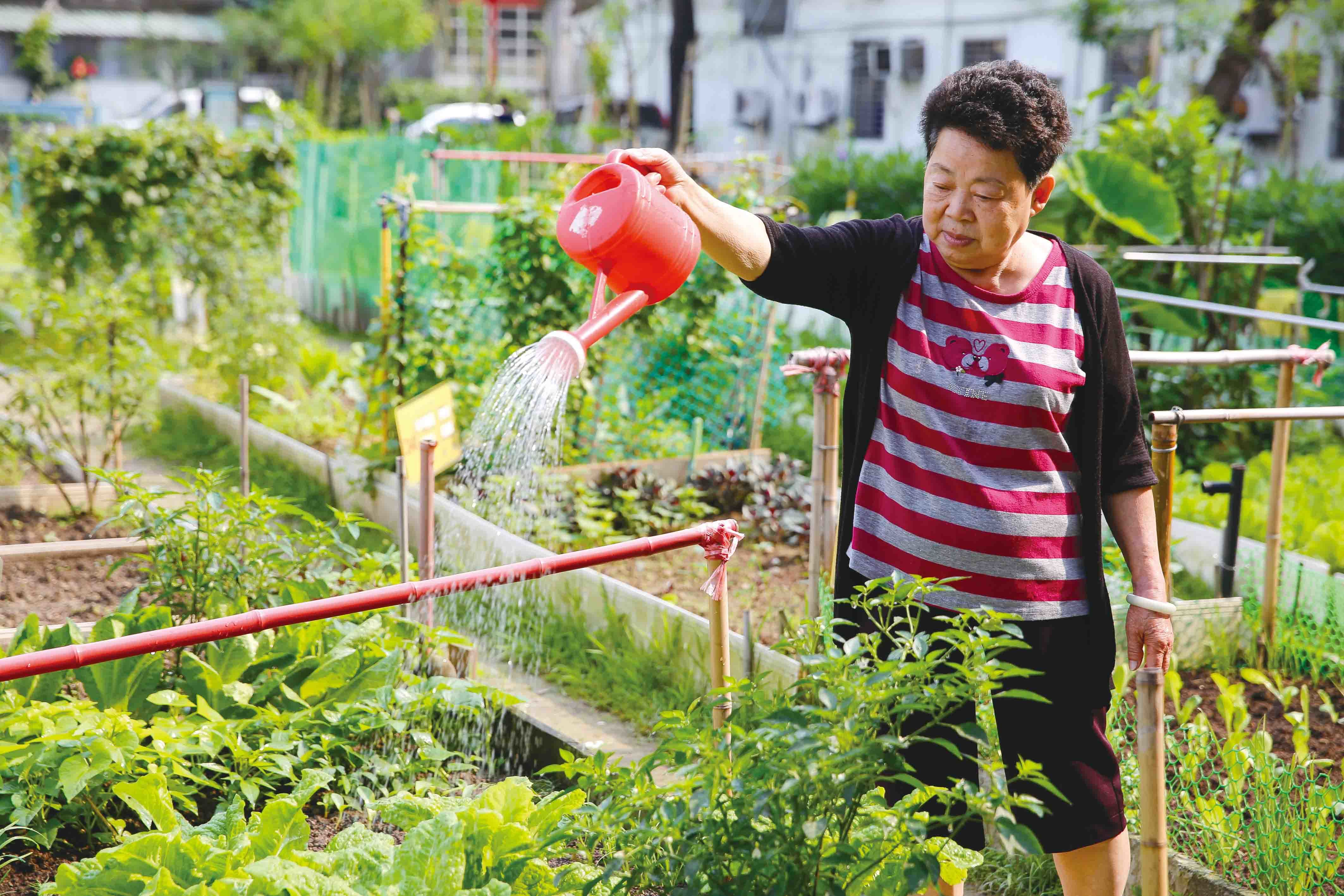
5. Bliss Farm is located in Fujian Borough. The residents care for the crops like they were their own children. (Photo: Jilin Yang)
Whether the weather is hot and sun-drenched, or overcast and sprinkling, there is always someone inspecting their crops, watering and weeding and taking the time
to chat with the owner of the next farm. Lin Jihong says that although people have been living in the same community, they have not known one another. Once they have started a micro-farm, everyone takes care of their crops like they are their own children. Carrying out the same activity and having something in common to talk about has turned strangers into good friends.
Zheng Yumei and a group of lady friends, although busy from morning until noon, still don‘t want to go home to cook lunch. Early morning, they turn the soil and sow seeds while enthusiastically discussing whether it is best to plant lettuce or celery this season. They don’t have to go into the mountains to grow these crops, for in this green-pearl urban community farm, they enjoy and interact with nature, and experience a small yet significant sense of bliss.
After a while, this beautiful farm will be filled with glossy green head lettuce, Guangdong lettuce, and Fushan lettuce. The borough residents are planning to add some centella to retain moisture. Some have put in short canopy frames to prepare for the growing of dishcloth gourd, the vines of which climb. Everyone is full of confidence about their farm plot, and excited. It is not necessary to travel far to enjoy carefree living. In Taipei, this garden city, green spaces are widespread.
Photos _ Jilian Yang, Public Works Department Parks and Street Lights Office, and Taipei City Yangming Home for the Disabled, Taipei City Government

1. Many people in Taipei are planting vegetables in once-unused community spaces, achieving physical and emotional wellbeing. (Photo: Jilin Yang)
How popular is “being a farmer” nowadays? International futures expert Jim Rogers once said that if you want to become rich, you should become a farmer. However, in cities where space is at a premium, becoming rich by farming is easier said than done. Many people are nevertheless making use of rooftops, balconies, and other empty spaces in their communities to grow fruits and vegetables. These people are not pursuing material wealth, but rather physical and emotional well-being, as well as the green beautification of their communities and even their entire cities.
A Community That Farms Together and Cooks Together
In April of this year, Happy Farm in the Pengcheng Borough (鵬程里) of Songshan District was harvested. A special event was held to celebrate the achievement and share the fresh food. The residents of this borough were invited to participate, and the harvested fruits and vegetables were used to create a variety of vegetarian dishes, enabling everyone to experience the fun of field and garden cultivation and harvesting. This was one of the sweet fruits of the Taipei City Government’s efforts to promote its Garden City Project. Farming has already become an indispensable part of life for this group of city residents.
Li-Yuan Huang (黃立遠), director of the Parks and Street Lights Office, Public Works Department, Taipei City Government (台北市政府工務局公園路燈工程管理處), notes that the promotion of Taipei as a garden city is mainly focused on urban unused spaces and the rooftops of public buildings. _ese include 12 public-building rooftop farms established with the assistance of the city’s Department of Economic Development, 239 micro-farm projects under the Department of Education (教育局), six farm-demonstration plots under the Parks and Street Lights Office, and 14 plots for a green community project under the jurisdiction of the
Department of Civil Affairs (民政局), as well as five public-rooftop farms under the Department of Social Welfare (社會局) and five farmland plots under Taipei City Hospital (台
北市立聯合醫院). Already, an accumulated 77,846 square meters of land have been put to use. The total number of people participating in farming activities has reached 22,590. This project has already been implemented by government agencies from top to bottom, and has gradually progressed to public proposals from bottom to top. One and all have the opportunity to develop a family, company, or community farm.

2. Pengcheng Borough’s Happy Farm is the first farm open to public participation in the Songshan District. (Photo: Parks and Street Lights Office, Public Works Department, Taipei City Government)
For example, the land for Pengcheng Borough’s Happy Farm was originally slated to be a parking lot. Last year, in July, to complement Taipei’s garden city policy, the residents of this borough were invited to a meeting to participate in the planning and design of this plot, the goal to create an ideal vegetable garden. Xu Yanjian (許顏建), the Pengcheng Borough chief, says that,“One small farm has brought about incredibly positive influence on the lives of our residents.”
The residents have been very keen to participate. Children learn about the growth process of plants as they farm, and the community has gained additional recreational space. Organic cultivation methods are advocated, and volunteers provide guidance to children in planting, composting, and removing insects without the use of pesticides. The plot-adoption method has helped residents understand the importance of maintaining a sustainable environment. By way of example, although butter_ies can be seen swi_ly flying about, there are no traces of destructive pests.
Xu explains that, “This is the achievement brought about by the careful attention paid to the care of this farm by all of the participating residents. At night they no longer watch TV. Instead, they make a special trip to the farm carrying flashlights to catch insects. This has become very common.” Happy Farm is the first farm open to public participation in the Songshan District. Xu notes the deep pride that all borough residents have taken in this initiative.

3. The residents of the Taipei City Yangming Home for the Disabled have shown a high level of interest in gardening work. (Photo: Taipei City Yangming Home for the Disabled)
Therapeutic Rooftop Garden for the Mentally and Physically Impaired
Across the city on Yangmingshan (陽明山), the Yongfu Branch of the Taipei City Yangming Home for the Disabled (陽明教養院永福院區) maintains an inspiring rooftop farm. The Yangming Home for the Disabled is the only public- welfare institution for the mentally and physically impaired in Taipei City. As the Yongfu Branch is on a narrow plot of land, most of its daily-living activities are limited to within the building, and there is a lack of green space, notably for outdoor activities. Administrators therefore referred to the emerging model of social care – the Green Care model – used in European countries for the promotion of
healthcare and the integration of farming and animal husbandry. In addition, they worked with a professional therapist to organize horticulture-therapy sessions. The home’s sixth floor rooftop has been used to create a rooftop farm, with detailed planning carried out to develop leafy vegetable, herb, and fruit-tree growing areas, creating a place where the 150 residents of this home can relax and admire the plant ecology.
As the majority of the home’s residents are wheelchair-bound, the passageway to the rooftop had to be made barrier-free. In addition, the height of the potted plants had to be suitable for those in wheelchairs, and a space had to be created for wheelchairs to be turned around. As the residents are unable to carry out complicated or overly exertive farming tasks, an automated watering system was installed. From irrigation to the addition of compost, everything features smart design, so that the residents are not required to carry out strenuous physical activities in order to get close to greenery.
This rooftop farm has been operating for nearly half a year. According to the observations of social worker Zheng Xinyi (鄭心怡), some residents may be resistant to exercise, but they express a high level of interest in gardening work. Although some residents are not able to personally engage in care for the rooftop farm, they can still find an escape from their pressures in this lush green environment.
Zheng says that this rooftop garden has allowed the residents to transform their role from “dependent on others” to “producers.”This has brought great benefit in terms of increasing sensory experiences, elevating confidence, and improving agility. These are positive outcomes that the social workers, volunteers, and family members are happy to see. The harvest from the rooftop farm is the source of the most welcome, healthy, and non-toxic ingredients in the home’s kitchen. Zheng smiles as she says that this rooftop farm has been an unexpected “windfall” for all involved: “We eat vegetables that we have planted ourselves. We plant what we want to eat. There is no better way to get closer to nature, and to benefit physical and mental health!”

4. The Taipei City Government, in promoting the Garden City Project, has broken through the cold and detached relationships among city residents to reestablish interactions. (Photo: Jilin Yang)
Fresh Green Pearls Along Streets and Lanes
Along busy Section 4 of Zhongxiao East Road (忠孝東路), residents have spontaneously opened a farmers’ market in a small lane. _ere are only 10 or 20 stalls, all manned by farmers who refuse to use chemical pesticides or fertilizers, selling non-toxic agricultural products. The farmers who come here are looking for a market for their selfgrown-crops, and to share their beliefs regarding living in a friendly, natural environment with Taipei residents.
This small market reduces the distance between production areas and dining tables. It is like a small green “seed of desire” for a garden city among Taipei residents that has burst open in the middle of the cement jungle.
The Taipei City Government is systematically promoting the Garden City Project. In recent years, farms and gardens have been popping up all over in communities and neighborhoods. Along Guangfu South Road (光復南路) in Fujian Borough (復建里) is Bliss Farm. Along Fujin Street (富錦街) in Minsheng Community’s (民生社區) Dongrong Borough (東榮里) is Happy Farm. Both are community farms voluntarily set up by neighborhood residents. Each year, neighborhood residents can register to grow vegetables free of charge, and supply has not been able to keep up with demand.
Between lanes 32 and 46 along Guangfu South Road is a plot of land that sat idle for many years after a military dependents’community was demolished. In the past, many local residents made a deliberate effort to avoid this area of blight. Lin Jihong (林際泓), who was serving as chief of Songshan District’s Fujian Borough, persuaded the military to offer up the land for farming. He first portioned out a grid of 48 micro-farm plots, then leased them to residents free of charge. He states that, “In the beginning, I thought that with everyone being so busy, no one would want to plant vegetables. I never would have expected that in a few days all of the plots would be taken.” The current borough chief, Lin Kunxin (林坤信), has expanded the number to 168 plots. Each hundreds of households scramble to lease a plot.
Dongrong Borough’s Happy Farm covers an even larger area, more than 800 square meters. Originally, this was a lot left empty after an old Air Force dependents’ village was demolished. Zheng Yumei (鄭玉梅), the borough chief, took advantage of the city government’s organizing of the Taipei International Flora Exposition to ask the military department to allow this lot to be turned into farm space. She then partitioned 180 small plots to allot to neighborhood residents to grow fruits and vegetables. There are more than 3,000 households in this borough, and at the end of each year there is also a great scramble to draw lots.
Su Yiping (蘇怡萍), head of the Horticulture Section (園藝科) of the Parks and Street Lights Office, says that the Taipei City Government’s promotion of the Garden City Project has broken through the cold and detached relationships among city residents to reestablish interactions. Farms are equivalent to extending green spaces, increasing the city’s ecological function. It is hoped that, through reconnection with nature, all will be helped via the healing effects, such as relaxation of the body and mind, and improvement in physical health.

5. Bliss Farm is located in Fujian Borough. The residents care for the crops like they were their own children. (Photo: Jilin Yang)
Whether the weather is hot and sun-drenched, or overcast and sprinkling, there is always someone inspecting their crops, watering and weeding and taking the time
to chat with the owner of the next farm. Lin Jihong says that although people have been living in the same community, they have not known one another. Once they have started a micro-farm, everyone takes care of their crops like they are their own children. Carrying out the same activity and having something in common to talk about has turned strangers into good friends.
Zheng Yumei and a group of lady friends, although busy from morning until noon, still don‘t want to go home to cook lunch. Early morning, they turn the soil and sow seeds while enthusiastically discussing whether it is best to plant lettuce or celery this season. They don’t have to go into the mountains to grow these crops, for in this green-pearl urban community farm, they enjoy and interact with nature, and experience a small yet significant sense of bliss.
After a while, this beautiful farm will be filled with glossy green head lettuce, Guangdong lettuce, and Fushan lettuce. The borough residents are planning to add some centella to retain moisture. Some have put in short canopy frames to prepare for the growing of dishcloth gourd, the vines of which climb. Everyone is full of confidence about their farm plot, and excited. It is not necessary to travel far to enjoy carefree living. In Taipei, this garden city, green spaces are widespread.
 TAIPEI 2016Summer Vol.04—Basking in a Green Radiance The Whole City Is My Garden
TAIPEI 2016Summer Vol.04—Basking in a Green Radiance The Whole City Is My Garden